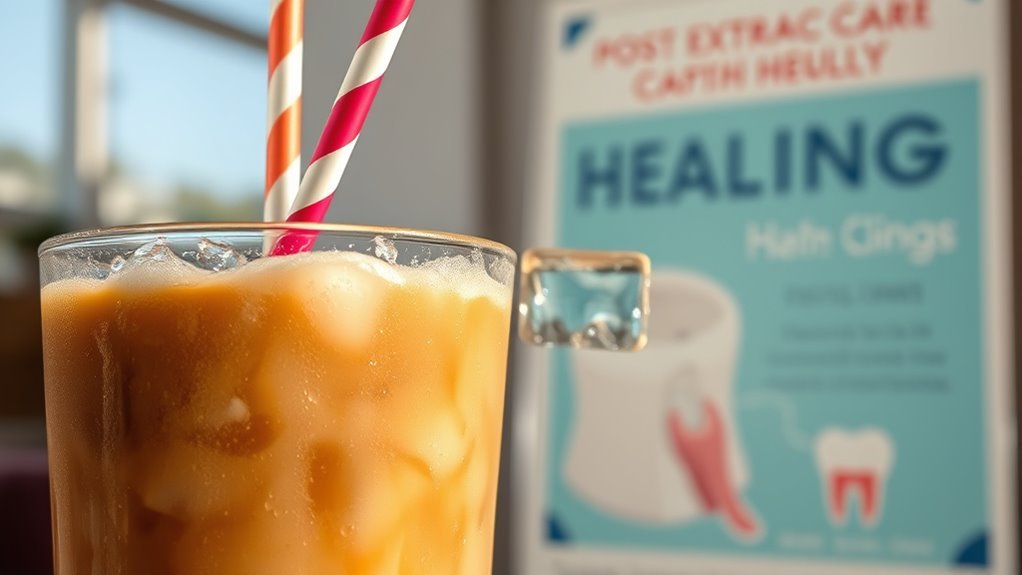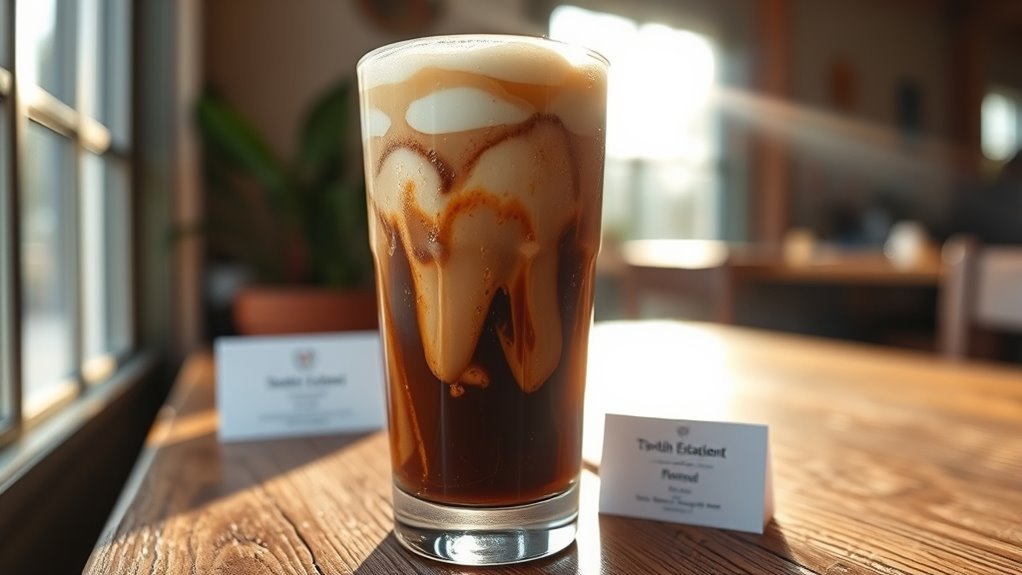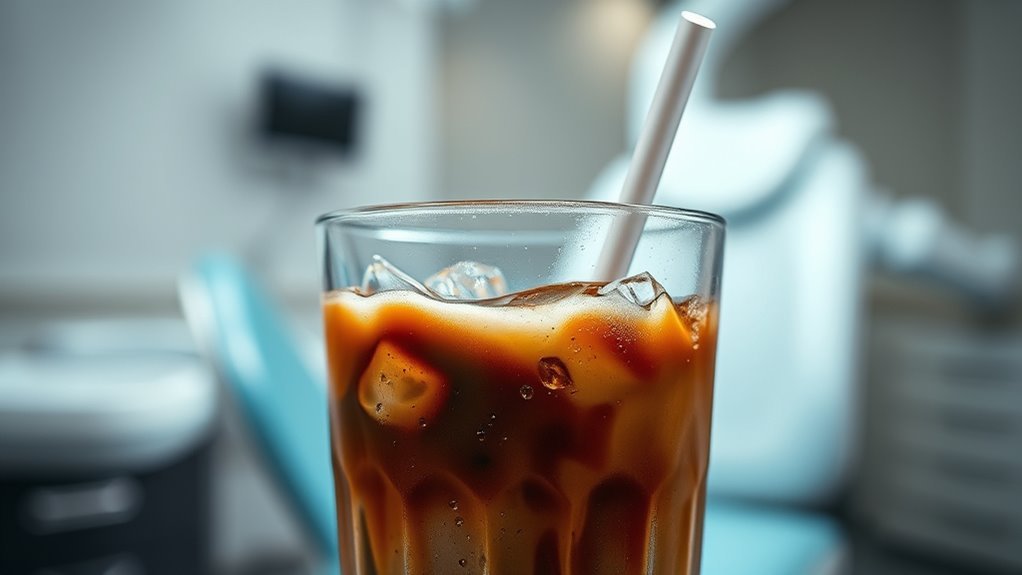Can You Drink Iced Coffee After Tooth Extraction
After tooth extraction, it’s best to avoid iced coffee immediately. The cold temperature can increase sensitivity and discomfort, and it may hinder your healing process. Plus, iced coffee can stain teeth and may lead to added sugars nurturing bacteria. Instead, opt for room temperature beverages for the first few days. Monitoring your recovery is essential, and you’ll find more tips on enjoying iced coffee safely and when to reintroduce it into your diet.
Understanding the Healing Process After Tooth Extraction

After a tooth extraction, understanding the healing process is essential for a smooth recovery. The initial healing timeline typically spans a week, with the first few days being critical for blood clotting. Immediately after the extraction, a blood clot forms in the socket, protecting the underlying bone and nerves. This clot is important for proper healing, so you should avoid activities that disrupt it, like sucking through straws or vigorous rinsing. As days pass, you’ll notice swelling and discomfort decreasing. By the end of the first week, the gum tissue will start to close, marking significant progress. Staying mindful of these changes will help you navigate your recovery effectively while ensuring a successful healing process.
The Role of Diet in Recovery
While it’s easy to overlook the impact of what you eat, your diet plays an essential role in recovery after a tooth extraction. Focusing on soft foods is important during this time. These foods help prevent irritation and allow your mouth to heal without additional strain. Incorporating options like yogurt, mashed potatoes, and smoothies can keep you nourished without discomfort.
Additionally, maintaining a nutrient balance is significant. Your body needs vitamins and minerals to promote healing and reduce inflammation. Foods rich in protein, such as eggs and soft fish, combined with fruits and vegetables, can support your recovery process. By paying attention to your diet, you can enhance your healing journey and enjoy a smoother recovery after your tooth extraction.
Why Iced Coffee Might Be Tempting

After tooth extraction, you might find yourself craving caffeine to combat fatigue. Iced coffee can offer a revitalizing cooling sensation that soothes discomfort while also providing a flavorful distraction from any pain. These factors make it an appealing choice during your recovery, even if you need to contemplate the potential risks.
Caffeine Cravings Post-Surgery
Why do caffeine cravings often intensify after surgery? After a tooth extraction, your body’s healing process can trigger post-surgery cravings, especially for caffeine. If you’re used to your daily coffee fix, you might experience caffeine withdrawal symptoms like headaches or fatigue, making iced coffee even more tempting.
Here are a few reasons why you might crave it:
- Routine Disruption: Surgery interrupts your daily habits, heightening your desire for comfort foods and drinks.
- Mood Enhancement: Caffeine can improve mood, which is appealing when you’re feeling down post-surgery.
- Energy Boost: You may seek a quick energy lift as your body heals.
While cravings are natural, you’ll want to reflect on the best choices for your recovery.
Cooling Sensation Relief
Caffeine cravings can lead you to seek relief in familiar comforts, and iced coffee often tops that list. The cooling effect of iced coffee can be particularly tempting after a tooth extraction. You might find yourself longing for that soothing relief, as the chilled beverage seems like an instant way to combat discomfort. The cold temperature can numb the area temporarily, providing a momentary respite from pain and swelling. However, it’s important to reflect that, while iced coffee can feel invigorating, it may not be the best choice for your recovery. Balancing your desire for that cool sensation with your healing process is vital. Always consult your dentist about what’s safe to consume post-surgery to avoid complications.
Flavorful Distraction From Pain
While the discomfort of recovery can be overwhelming, the rich and familiar flavor of iced coffee might provide a much-needed distraction. Engaging in pain management doesn’t always have to be about medication; sometimes, it’s about treating yourself to something enjoyable. Iced coffee offers a revitalizing break that can lift your spirits. If you’re considering flavor alternatives, think about:
- Adding a splash of flavored syrup for a sweet twist
- Mixing in some milk or cream for creaminess
- Experimenting with cold brew options for a smoother taste
These small indulgences can give you a moment of relief, turning your focus away from the pain. Just remember to sip slowly and choose options that won’t irritate your healing gums.
Potential Risks of Drinking Iced Coffee

Although iced coffee may be a tempting choice after tooth extraction, it carries several potential risks that could hinder your recovery. First, the cold temperature can exacerbate sensitivity, leading to increased discomfort. Additionally, iced coffee can stain your teeth, which is crucial to reflect on when maintaining oral hygiene during recovery. Moreover, if you add sugar or cream, it may contribute to unwanted bacteria growth, complicating your healing process. Finally, caffeine can interfere with pain management by potentially increasing anxiety or discomfort. It’s important to prioritize your recovery and weigh these risks before indulging in iced coffee. Always consult your dentist for personalized advice on post-extraction dietary choices to guarantee a smooth healing journey.
Recommended Beverages Post-Extraction
After a tooth extraction, it’s essential to choose your beverages wisely. Consider the temperature, as hot or cold drinks can affect your recovery, and be mindful of caffeine’s potential to dehydrate you. Staying hydrated with the right fluids will support your healing process effectively.
Temperature Considerations
When considering what to drink after a tooth extraction, it’s essential to pay attention to temperature. Your mouth may experience some temperature sensitivity, so choosing the right beverages can help you avoid discomfort. Here are some recommended options that align with your cold tolerance:
- Room Temperature Water: Hydrates without causing sensitivity.
- Herbal Tea: Enjoy it warm, not hot; it’s soothing and caffeine-free.
- Smoothies: Opt for room temperature; they’re nutritious and easy to consume.
Avoid icy drinks right after the procedure, as they may aggravate your healing site. Instead, listen to your body and select beverages that feel comfortable. This way, you’ll support your recovery while enjoying your drinks.
Caffeine Effects
While you might be enthusiastic to enjoy your favorite iced coffee after a tooth extraction, it’s important to contemplate the effects of caffeine on your healing process. Caffeine can increase your heart rate and blood pressure, potentially complicating recovery. If you usually consume caffeine, you may experience withdrawal symptoms, such as headaches or irritability, if you cut it out abruptly. However, if you have a high caffeine tolerance, you might manage these symptoms better. It’s wise to consult your dentist about your caffeine intake post-extraction. They could offer personalized advice based on your specific situation. Ultimately, prioritizing your recovery is essential, so consider alternatives that won’t interfere with your healing and comfort.
Hydration Importance
Staying hydrated is vital for your recovery following a tooth extraction, as it helps promote healing and reduces the risk of complications. Implementing effective hydration strategies will guarantee you’re meeting your water intake needs during this important time. Here are some recommended beverages post-extraction:
- Water: The best option for hydration; it’s gentle and effective.
- Herbal tea: A soothing choice that can provide warmth without caffeine.
- Broth: Nutritious and easy to consume, helping you stay hydrated and nourished.
Avoid sugary or acidic drinks, as they can irritate the extraction site. Focus on these options to support your healing process and keep your body well-hydrated. Remember, a well-hydrated body is key to a smooth recovery!
When Can You Return to Regular Beverages?
Once your dentist gives the green light, you can gradually reintroduce regular beverages into your diet. It’s important to follow regular beverage guidelines and consider your recovery timeline expectations. Typically, soft drinks and juices can be resumed within a few days, while iced coffee may need a bit more time due to its temperature and acidity.
| Day Post-Extraction | Beverage Type | Notes |
|---|---|---|
| 1-3 | Water and Clear Broth | Stay hydrated |
| 4-5 | Juices | Avoid acidic options |
| 6-7 | Soft Drinks | Limit carbonation |
| 7+ | Regular Beverages | Introduce gradually |
Listening to your body and following your dentist’s advice will guarantee a smooth shift back to your favorite drinks.
Tips for Enjoying Iced Coffee Safely

To enjoy iced coffee safely after a tooth extraction, it’s essential to wait until your dentist advises you it’s appropriate. Once you get the green light, consider these tips to enhance your experience while being mindful of your recovery:
Wait for your dentist’s approval before enjoying iced coffee post-extraction, then follow tips to ensure a safe and tasty experience.
- Opt for Iced Coffee Alternatives like herbal teas or smoothies that are gentle on your mouth.
- Experiment with Flavorful Infusions using natural ingredients like vanilla or cinnamon to elevate your drink without added sugar.
- Use soft straws to minimize pressure on your extraction site, ensuring a comfortable sipping experience.
Listening to Your Body During Recovery
During your recovery, it’s essential to listen to your body. Pay attention to your pain levels, stay hydrated, and be mindful of any food sensitivities that may arise. These factors can greatly impact your healing process and overall comfort.
Monitor Pain Levels
As you recover from tooth extraction, it’s crucial to monitor your pain levels closely. Pain management is key to a smooth recovery timeline. Listen to your body and take action if discomfort increases. Here are a few tips to help you gauge your pain:
- Track pain intensity: Rate your pain on a scale from 1 to 10 to better understand fluctuations.
- Note triggers: Identify any activities or foods that worsen your pain and adjust accordingly.
- Communicate with your dentist: Don’t hesitate to reach out if your pain persists or worsens beyond what’s manageable.
Hydration Importance
Staying hydrated is essential for your recovery after a tooth extraction. Proper hydration helps maintain fluid balance in your body, which is vital for healing. Listen to your body—if you’re feeling thirsty, it’s a sign you need fluids. Incorporate hydration strategies, like sipping water throughout the day and avoiding dehydrating beverages. Aim for at least eight glasses of water daily, but adjust based on your activity level and climate. Herbal teas or broths are also excellent options. If you notice any signs of dehydration, such as dizziness or dry mouth, act quickly to rehydrate. Prioritizing your fluid intake not only supports recovery but also boosts your overall well-being during this important time.
Food Sensitivity Awareness
While your body heals from a tooth extraction, being mindful of food sensitivities is essential for a smooth recovery. Listen to your body closely; it can signal food triggers or sensitivity symptoms that may hinder your healing process. Make necessary dietary adjustments to support your recovery and avoid complications.
- Stay alert for any unusual reactions after eating.
- Consider keeping a food diary to track what you consume and how it affects you.
- Prioritize allergy awareness by avoiding known allergens and processed foods.
Signs of Complications to Watch For
After a tooth extraction, it’s important to monitor for signs of complications that may arise. Pay attention to post-operative symptoms like excessive bleeding, swelling, or persistent pain that doesn’t improve with time. If you experience these, it could indicate an issue. Infection signs are especially significant; look for increased redness, warmth around the extraction site, or pus discharge. A fever may also accompany an infection, so keep an eye on your overall health. If you notice any of these symptoms, it’s crucial to take them seriously. Addressing complications early can help prevent further issues and promote a smoother recovery. Your freedom to enjoy life post-extraction depends on how well you monitor your healing process.
Consulting Your Dentist for Personalized Advice

Consulting your dentist for personalized advice is essential for a smooth recovery after a tooth extraction. They’ll provide guidance tailored to your unique situation, ensuring you understand the necessary post-operative care. Here are some key points to discuss during your dental follow-up:
- Ask about what foods and beverages, like iced coffee, are safe to consume.
- Inquire about signs of complications that may arise during recovery.
- Clarify any restrictions on physical activities that could impact healing.
Frequently Asked Questions
Can I Add Sugar to My Iced Coffee After Extraction?
You can definitely add sugar to your iced coffee, but it’s better to contemplate sugar alternatives for your dental health. Refined sugars can promote bacteria growth and lead to complications, especially after dental procedures. Using alternatives like stevia or erythritol can satisfy your sweet tooth without harming your recovery. Always listen to your body, and if you experience any discomfort, it’s best to consult your dentist for personalized advice.
Is It Safe to Drink Iced Coffee if I Have Stitches?
Did you know that nearly 90% of people experience some discomfort after dental procedures? If you have stitches, it’s essential to prioritize stitch care and maintain good dental hygiene. Drinking iced coffee isn’t ideal since its cold temperature may irritate your stitches or affect healing. It’s best to wait until your stitches are removed. In the meantime, focus on staying hydrated and choosing room temperature beverages to support your recovery.
How Long Should I Wait Before Drinking Iced Coffee?
After a dental extraction, it’s essential to prioritize post extraction care for best recovery. You should generally wait at least 24 to 48 hours before consuming iced coffee. The cold temperature can soothe discomfort, but the acidity and caffeine might irritate the extraction site. Always listen to your body and consult your dentist for personalized advice, ensuring a smooth dental recovery without complications. Your comfort and healing should always come first.
Can Iced Coffee Affect My Pain Medication?
Iced coffee can impact your pain relief if you’re taking medication. Caffeine may amplify certain side effects, like increased heart rate or anxiety, which could interfere with how your body processes pain relief. If your medication is sensitive to caffeine effects, it’s wise to limit your intake. Always consult your healthcare provider for personalized advice to guarantee you’re managing pain effectively while enjoying your favorite beverages. Your comfort and recovery are essential.
Will Iced Coffee Stain My Teeth After Extraction?
Iced coffee’s like a dark cloud hovering over your dental care routine—it can indeed stain your teeth, especially after an extraction. With tooth sensitivity heightened during recovery, exposing your teeth to dark beverages may not be wise. It’s best to wait until you’re fully healed. Protecting your smile is essential, so consider sipping lighter drinks instead. Your teeth deserve the best care, and avoiding potential stains will help maintain their brightness.






